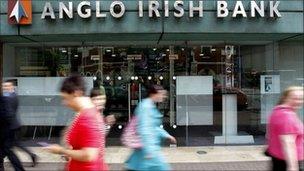The impact of Anglo Irish Bank in Northern Ireland
- Published

The Irish government may have to spend 34bn euros bailing out Anglo-Irish
In the wake of the Irish government's announcement that the Anglo Irish Bank bail-out could amount to up to 34bn euros, Conor Spackman looks at the bank's involvement in Northern Ireland and the potential impact of its failure.
The collapse of Anglo Irish Bank is by far the biggest corporate failure in the history of the Irish Republic, putting the very economic stability of the state in peril.
The Irish government has been forced to step in and commit a massive proportion of its income to allow the bank to fulfil its obligations.
Such is the scale of the bail-out, 32% of GDP, that it is inevitable that much of the money will have to come from the taxpayer.
The rest will come from recouping the money that Anglo lent, mainly to property developers and other investors.
It is unclear how much of that money is owed by businesses and individuals in Northern Ireland.
Finding out the size of the debt and how much toxic it will be is key to establishing the potential impact on the Northern Ireland property market and thus the wider economy.
The beginnings
It was 1995 when Anglo Irish, which was founded in the Irish Republic in 1964, first took an interest in Northern Ireland.
In 2004, Business Eye magazine reported how its chief executive Sean Fitzpatrick, a name now synonymous with Anglo's collapse, was in Belfast at a business dinner when he bumped into Neil Adair, a fellow chartered accountant.
The pair became friendly and not long afterwards, Mr Adair was asked to set up Anglo's first operation in the northern part of the island.
Its apparent success was swift and stratospheric.
By 2006, the Belfast outlet held a loan book of almost 1.5bn euros.
Its costs base was also running at a fraction of standard industry levels.
There were boasts in the press about how it did business much more quickly than its rivals, with bureaucracy at a minimum.
In the end, the banking crisis exposed that performance as a phantom.
Following the money
The question for those who have been charged with nursing the critically ill patient is who in Northern Ireland borrowed those hundreds of millions and whether it is going to be paid back.
Only some details are in the public domain.
As in the Republic, Anglo's main corporate customers in Northern Ireland were property developers.
Some of those clients were prosperous businesses who continue to do well and meet their obligations despite the downturn.
Michael Herbert, who owns the Lesley property empire, and William Ewart Properties, owned by businessmen Frank Boyd and Andrew Creighton, seem to be flourishing.
Others, including Taggart Properties and the Sheridan Group, owned by Peter Curistan, have not fared so well.
Neil Adair himself has also had dealings with Anglo since leaving in 2006 to set up his own property business, PBN, along with seasoned developer Patrick Kearney.
Golden circle
Further details of many of Anglo's dealing in Northern Ireland are expected to emerge as the Irish government and its mechanism for dealing with toxic debt, the National Assets Management Agency, begin to unravel who owes what - much of the information will emerge through the courts as cases are taken against those who cannot pay.
Only then will any impact on the property market be clear.

Michael Taggart was one of Anglo's most prominent customers in Northern Ireland
Northern Ireland's other prominent association with Anglo is through a Fermanagh man once listed as one of the richest in Ireland.
Sean Quinn used much of his fortune to build up a 25% stake in Anglo through complicated financial products which effectively amounted to a gamble that the share price would continue to rise.
When the price collapsed, Mr Quinn was forced to sell much of his holding.
In an attempt to stop the shares appearing on the open market and driving the price down further Anglo organised a share support scheme.
In what was known as "The Golden Circle" transaction the bank lent money to a group of investors so they could buy the shares.
Reports have repeatedly linked Mr Kearney to the Golden Circle and he has not denied it.
Paying back the Anglo debt is likely to mean a generation of pain for the ordinary Irish man and woman with higher taxes effectively resulting in diminished public services.
Sean Quinn has estimated that his losses in Anglo - about 2.6bn euros - will set his business back a couple of years.
If only the Irish taxpayer could say the same.